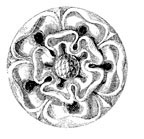
A Eucharistic Healing
'KNEEL'
The following is my personal account of a day I will remember for the rest of my life. It occurred in the late spring of 1996. I have endeavored to be as plainly factual and objective as possible, while also conveying my subjective reactions at the time and in retrospect. While no one is obliged to believe what I am about to recount, I would only ask that one keep an open mind.
During my conversion from Baptist Protestantism to Catholicism, I underwent many challenges, and welcomed most of them. However, one difficulty I faced was particularly troublesome. In the process of my initial catechesis, I had not been sufficiently instructed in the Sacraments. As a result, I suffered unnecessarily in trying to comprehend these profound mysteries.
As a Baptist, I had been taught that the Lord’s Supper (what Catholics call Holy Communion) was strictly symbolic. I was referred to Christ’s words: “Do this in remembrance of me” (Lk. 22:19). I was assured that this scriptural passage was proof that the purpose of the Lord’s Supper was only to remember what Christ had done for us on Calvary. This was my belief for almost 30 years. And as an analytical/rational sort, it certainly made sense. Why would anyone believe differently? The first time I heard that Catholics believe that the Eucharist is Christ’s body, blood, soul, and divinity, I thought it was absolutely bizarre and idolatrous.
We should all frankly admit that this is very unusual and hard to accept. A quick reference back to John 6 will prove that the truth of the Eucharist has been hard to accept from the very beginning. Christ said, “Amen, Amen I tell you. Unless you eat the flesh of the Son of Man and drink his blood, you do not have life within you. Whoever eats my flesh and drinks my blood has eternal life, and I will raise him on the last day. For my flesh is real food and my blood is real drink. Whoever eats my flesh and drinks my blood remains in me and I in him” (Jn. 6:53-56). And afterwards, all of the people applauded and said, “Yes, of course! Brilliant! We believe, we believe!” Right?
Wrong. This is what happened: “Then many of his disciples who were listening said, ‘This saying is hard; who can accept it?'” To which Jesus replied, “Does this shock you? What if you were to see the Son of Man ascending to where he was before?” In essence, I believe He was trying to get them to accept His difficult teaching on the Eucharist by telling them that they would see other astounding, miraculous things that they could neither explain nor deny (and, in fact, Jesus had already performed miracles). As such, He was asking them to suspend their intellectual disbelief in humble recognition that man is not always able to explain everything that God does or asks of us.
You May Also Enjoy
Review of The End of the Modern World
Fr. Pavone is a great prolife leader, but why can't he think with the mind of the Church instead of the mind of the Republican party?
Pope Paul VI's words are a breath of fresh air in a world suffering the horrendous effects of the contraceptive mentality.

